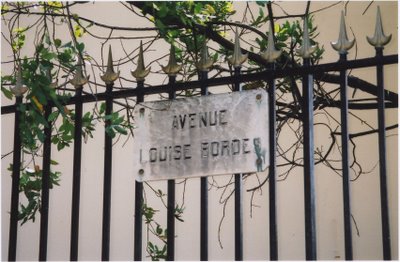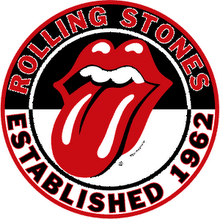Ah les interviews de Rolling Stone ! On se croirait presque revenu aux temps où la barrière infranchissable avec eux n'existait pas. Enfin, Jagger est sur ses gardes, faut pas pousser.
Du Ron, du Charlie, du Jag, et du Keith, séparément mais tous.
___________
Notes from the Babylon Bar
On the road with the Rolling Stones
Backstage, on the second night of the Rolling Stones' Bridges to Babylon tour, most of the world that will cosset and comfort them over the next year is up and running -- a world that is serviced by at least six chefs, including a dedicated dessert chef, and that allows two full-time tour employees to have their job listed in the tour program as Backstage Ambience. In the area known as Bar Babylon, I float on the edge of a conversation with some non-performing Rolling Stones insiders. The hot topics of conversation: the best face creams, the rise of Krispy Kreme donuts. Over on the other side of the room, Keith Richards greets the visiting blues wives (Muddy Waters', Willie Dixon's). Keith's father, Bert, wanders by, smoking a pipe, talking about the twenty lengths he swims each day. Ronnie Wood has some glitter on his face, which he excuses as (a) "posh cocaine" and (b) a side product of all the women he has to greet. "Where's wardrobe?" he asks. "And why am I asking now? We've already done one show...."
Keith Richards is scooping ice into a glass with his right hand when we are introduced. My first moment with him. Warm pirate grin; ice-cold handshake.
These shows start with a bendy, overexcited, unanchored "Satisfaction." Each Rolling Stone easily slips back into role. On Mick Jagger's face, there's the determination and the scowling effort and, when it's going well, that swagger.
He shimmies and contorts himself in a flurry of hyperactivity, always as though he is trying to prove something. Charlie Watts has that slightly bemused, patient look, his head turned slightly to one side, half-smiling: It's silly, really, isn't it? Ron Wood assumes his customary jack-the-lad demeanor. Whenever a camera for the overhead screen comes close, he displays his casual repertoire of daftness: the stuck-out tongue, the stupid face. As for Keith Richards . . . anyone who is cynical about the Rolling Stones' motives in touring the world once more -- as plenty, quite reasonably, are -- would struggle to explain Richards' exploding grin, at once childlike and old-man wise, stuffed with delight and reverie.
This is the Bridges to Babylon tour. Except . . . well, I'll let Mick Jagger explain it. "We haven't got a fucking bridge yet," he pouts. It won't arrive until ten days into the tour. "I ordered it," he laughs. He says it's like decorating your flat: Everything's supposed to be ready for a party on Friday, but when Friday comes, there are no curtains.
"And," he repeats, "there's no fucking bridge."
What's the worst part of getting old?
Ronnie Wood: When your ankles start to change color [lifts up an ankle and shows off discolored blotches]. It's not serious. It's probably just broken veins. I still feel like I'm twenty-three. My kids are, like, "You're so old." That's the hardest thing about old, when the kids kind of rub it in.
Mick Jagger: I suppose you do think about the time that's allotted to you more than when you were younger. The mortality thing obviously has a stronger pull for you. It's an imminent truth; it's not necessarily a bad thing. You realize -- much earlier than my age now -- that you won't be able to play for England's football team, just to take a really crass example. So you can't have that life again. Unless you believe in reincarnation or whatever. Reincarnation? That's a whole other question. I find people who talk about that sort of thing in interviews idiotic. And I don't want to go down with them.
Charlie Watts: It's only if my wife mentions growing old, because I think it affects women a lot more than men, this stuff. It'd be nice to be rich and grow old -- I'd hate to be shuffling 'round Brixton Market in a pair of slippers. Then again, I'll probably be shuffling 'round the garden.
Keith Richards: I haven't found it yet. I still zoom around and do what I do. I'd hate to have to go 'round thinking about [derisively] health and shit like that. It's never occurred to me. This is what I am, this is what I've got, and I do what I do. It's such a sturdy frame, this; I even abused it to see how far it could go, but that was a long time ago. Hey, I've got the measure of this thing. [Lights a cigarette] There's only one really fatal disease, I've concluded. It's called hypochondria. And it is deadly.
Some Myths Addressed, Some Propagated #1
The Rolling Stones history has been repeated and regurgitated and mulched over and over. I read all the books: the smart ones, the sturdy ones, the dumb ones. It is, I decide, only the occasional pithy detail that demands revisiting.
Me: You are, I believe, one of the few rock stars who actually has pushed a TV out a window.
Keith Richards: Yeah. In the old days, motel TVs were bolted to the floor, so that was the challenge. Room service had pissed us off by refusing to serve us.
Me: They weren't just late?
Richards: No. We didn't do it for little things. That was 1969, and as I say, it was a very strange year.
Me: How far down did it fall?
Richards: About it stories.
Me: Was it exciting?
Richards: Well, by then it had become a project. You do things like that on the road when you've been up four or five days.
Me: Do you still skip nights?
Richards: I'll do two days sometimes.
Me: On this tour already?
Richards: Yeah. A couple of times.
Me: But no three-dayers?
Richards: Not unless I have to. Nine was as far as I could go. And loads of four and fives, especially with Ronnie in the '70s. But after three days, another thing clicks in. It's a fascinating world. I was so interested in what I was doing, whether it was music, songs, tapes, listening, talking, that sleep seemed superfluous.
Me: Presumably you can't do the long multiples without the right drugs.
Richards: [Nods] Oh, no, the chemistry comes into play here. Incredibly important, of course. It was a laboratory. As far as I was concerned, the whole thing was a scientific expedition.
Brief scenes from an interview with Mick Jagger
There are two chairs and a sofa. Mick Jagger takes the sofa. I take a chair. That leaves one chair spare. I move to put my tape recorder on it. "I was going to put my feet up on it," says Mick Jagger. "But it's all right. We can do both." He looks around. It is the middle of the afternoon. "So have we got any drinks? Water, or martinis, or whatever we're drinking?" We are, as I am sure he is aware, drinking Evian. He squints toward the window. "Bit bright, isn't it?" he says.
It's difficult interviewing Mick Jagger. He is not a man who enjoys being pinned down. "Why should you be?" he reasons. "One's pinned down enough in life. You're so pinned down...." There is a way he talks that seems to be a perpetual smirk, as though he wants you to know that the very act of sitting here, answering your questions, is an absurd indulgence. Of the tour he says, "It is a great thrill It's my vocation. It's what I do. If I can do it well, I enjoy it. And if I can't do it well, I'll make sure I do it better." When he says things like this, he seems so careful in what he says that he sounds insincere. In the end, I will wonder whether the strangest thing about Mick Jagger might be that beneath this veneer of insincerity, what he is actually hiding is sincerity itself.
The pre-tour Jagger media frisson has been provoked by Paul McCartney. McCartney says, in his new as-told-to memoir, that he turned Mick Jagger onto drugs. Jagger shakes his head, amused. He has a theory. "It's all to do with John Lennon being a saint and being the edgy one. Paul definitely had his edgy moments.... People now think he's this old wanker, that he never did anything and John did everything." He certainly seems paranoid.
"That's what I think, anyway. And he wants to say stuff that indicates that he was on the edge of things."
Do you mind being brought into it?
"I don't mind at all. Whatever he wants to say. Even though it isn't true. You know -- what does it matter? It's a lot of mythology, isn't it?" Jagger says that he first smoked outside England. "What does it matter? It's a load of old trollop, all of this stuff. How would he even know, unless I said, `Wow! I've never tried it before!' or `I'm so grateful!'? And how would he ever remember?"
Mick Jagger was once, in the early '80s, contracted to write a book. The story went around that when he tried, he simply couldn't remember. In fact, a version of the book was written by a ghostwriter whom Jagger employed. It's locked away in some vault. "It was just boring, trying to remember everything," he says. "It wasn't I couldn't remember everything, it was just . . . 'Euchhhh.'"
Some Myths Addressed, Some Propagated 2
Me: Did you read Marianne Faithfull's book?
Jagger: I couldn't read the whole thing. You only read what's serialized.
Me: Do you mind that she said Keith was a better lover than you?
Jagger: She had to say something. Something to sell it.
Me: So she didn't mean it?
Jagger: I've no idea if she means it. She said to my mother the other week that I was wonderful in bed and embarrassed my whole family.
Me: What on earth was the social situation that allowed this conversation?
Jagger: Do you really want to know? It was a cricket match at Paul Getty's house, in the tea interval. She said it to my mother and my father.
Me: But how does that just come up in conversation?
Jagger: Yes, exactly. She just came out with it, after a few Pimms or something.
I raise the subject with Keith Richards.
Richards: [Grins] She should know.
Me: Did it have the ring of truth?
Richards: Well, I wouldn't know. I've never made love to him.
What do your children nag you about?
Mick Jagger: [Gently indignant] They don't nag me! They're not allowed. [Puts on a daft Germanic voice] You vill not nag me!
Ronnie Wood: There are a few things. 'Oh, are you still in bed, Dad?' And then they jump on you. The worst thing is when they don't jump on you.
Keith Richards: That they don't see me enough. Which is true. But it's the nature of my job. They'll nag me, 'Ok you haven't sent me a fax,' because that's the way we communicate. Drawings, mostly, and little letters. I might be, `Guess who I'm with?' and draw a nose, and they'll know it's Ronnie.
Charlie Watts: My daughter? Playing jazz, I suppose. The same goes for my wife. I think the secret of a successful marriage is separate bathrooms.
Scenes From an interview with Charlie Watts
I am invited to Watts' hotel room, which is meticulously tidy. He reluctantly turns down his jazz, in deference to my tape recorder, but doesn't seem pleased with the compromise. His wife has just flown off to a horse show in Germany; he seems a little melancholy, but he oozes gentle dignity. When I ask a question that seems foolish, he furrows his brow, like a kind uncle trying to be patient with the wayward next generation, and simply says "Good Lord . . . " before gamely attempting a reply. "Mick's good at interviews, you know, and you get only so much, and he doesn't want you to have any more," he says. "Whereas I'll prattle on forever. But it's not of much importance . . . ."
He has mixed feelings about being on tour. "It's still a huge pressure," he says. "All I really like to do is play the drums with this band. The rest of it I find very difficult to take. The world of this is a load of crap. You get all these bloody people, so incredibly sycophantic. Us sitting here doing this is a bit. . " He looks along the sofa at me with friendly distaste. "Well," he says, definitely. "It is."
So we talk about the twenty-nine dogs Watts lives with on his stud farm in the English countryside. The numbers are growing because his wife is on a mission to save ex-racing greyhounds. "I used to have a pig, actually," he says. "Billy Pig." Billy Pig lived in the house until he got too big. Watts tells me of his sports memorabilia; of his earlier cowboy obsession; of the 1937 Lagonda Rapide that sits in the garage because he has never learned to drive; of his vintage guns. He is a collector and, one might deduce, a compulsive.
One of the most fascinating things about Charlie Watts is how, after sitting out some of the most extreme drug abuse of the late 20th century, he quietly and privately became a heroin addict himself for a period in the mid-'8os. I don't exactly bring it up, but he misunderstands a question I ask about Mick and Keith's fractured relationship during that decade. He nods. "I was very fucked up," he says. "I was warring with myself at that time."
We talk about the band. "I'm closer to Mick than I've ever been," he says. "I think Jerry's done that. The children and that. He's grown up a lot."
Would you accuse Keith of having grown up?
"No. He's a bohemian. They don't work by the book. He'll either miss very badly, whatever it is, or he's 100 percent and two weeks ahead of you. I've seen Keith fall asleep at business meetings about millions of dollars for him -- because of heroin, just nod out, and then wake up and answer a question."
And Ronnie?
"I don't really know him as well like that. He's a very likable person. He's not grown-up. He doesn't need to be. He's not at all sensible, Ronnie. It's not his role. He's a maniac."
For decades, Charlie Watts has followed an on-tour ritual. In each hotel room in which he stays, he sketches the bed. (Sometimes other things, too: a lamp, hotel signs, his meals.) It began when he was bored, which was often, and now he has to do it. He can't leave a room without doing it. "It's a panic," he says. "I always try to do it when I get there." It's a diary, of sorts. "All the rooms look the same, really," he says.
Some Myths Addressed, Some Propagated # 3
Me: Did you really use to own a Hovercraft?
Keith Richards: Yes. But it was the size of this table. I bought it for my son to play with. It went 'round the lawn for about two weeks. We hovered in there for a while. Interesting sensation. And then it went in the moat. It never came out the same.
(Perhaps that is the perfect metaphor for true, untrammeled, insulated '70s rock stardom in all its pointlessness and gloriousness. The Hovercraft went in the moat, and it never came out the same. But what the hell. It was your Hovercraft. And your moat.)
What Mick and Keith Did On Their Holidays
Keith Richards is discussing his lead singer's acting career. "As far as I'm concerned, I like to keep Mick busy doing rock & roll to stop him doing those things," he says. "Mick, to me, is a purely physical and audio person. I don't really think acting is his forte and metier. But at the same time, if you've got to do it, have another bash, boy."
You sound like someone who's seen "Freejack."
"No," he says. "Just the ads."
Nonetheless, Jagger has a new film awaiting release. Richards says he had no idea it even existed. The film, Bent, is about gay prisoners in a Nazi concentration camp. Jagger appears for the first twenty or so minutes as a faded drag queen, both in and out of drag, and he is quite splendid in it.
"Did you like Bent," Jagger asks me carefully, "or did you get bored?"
I reassure him. He says that he was a little wary about slipping into another frock. He's since been offered another drag part: "A gay man that's mad about Latins. I haven't read it yet."
Why do people come to you for that?
"I don't know. Because it's a laugh and they know that I'll . . . do things."
You have a great expression in Bent, as though you have done every last debauched thing but you simply don't care. I was vaguely wondering where you got that look from.
He smirks. "It's acting, darling."
Keith Richards has another new album, Wingless Angels, which he co-produced, played on and shepherded into existence. He has been hanging around and playing with a group of Rastafarians in Jamaica for twenty-five years. This music -- mostly drum rhythms and voices performing slow, soaring versions of traditional songs -- isn't, he says, just nice; it is "good for you. These people understand the necessity for trance in one's life. The beat they play is designed to be just slightly under heart-rate."
This is one of the mistakes people make with Keith Richards: They see him punching out the chords to a rough rock song, and they imagine that's where the whole of his heart is. But, more and more, Keith Richards' strength is his sentimentality. The closing two songs on Bridges to Babylon "Thief in the Night" and "How Can I Stop" -- are, even with Richards' strange voice curled around them, two of the most affecting. "See, chicks see the other side of me, which guys don't," he says. "I have a good empathy with women. I mean, nobody has ever divorced me." Quite who that is directed at, I think we should leave to the parties concerned.
When did you last cry?
Charlie Watts: When I last left home, because I hate leaving home. And I was a bit sad today because our remaining cat died. Jezebel. A bit sad, really. Well, not a bit sad. Very sad.
Mick Jagger: This morning, when my toast was burned. When I read your Madonna interview. She shouldn't have let you in the flat, I reckon.
Keith Richards: I cry quite often. I look at a picture of my grandfather sometimes, listening to music that he loved. And I cry for dead Jackie, my dead Rastaman who is on that record we just brought out.
Ronniee Wood: Watching Princess Di's funeral. All those poor people. So sad. It silenced everything, didn't it? Two days before, I was on the plane with Dodi. My wife used to go out with him. He proposed to her and everything. In fact, she dumped Dodi for me. I think that was a good move on her part.
A Conversation About David Duchovny and Premature Ejaculation
Me: Did you read what David Duchovny said about you recently?
Mick Jagger: David Duchovny?
Me: Do you know who he is?
Mick Jagger: I do indeed. X-Files. Actor. What did he say?
Me: He was talking about how much he liked you when he was young, and he said you "offered the promise of premature ejaculation."
Mick Jagger: [Slightly amused] What does that mean?
Me: I thought you could help me here.
Mick Jagger: The promise? In a sort of gay-sex way, I suppose. I assume. What else could you assume? [Pause] I met him.
Me: And he didn't mention this?
Mick Jagger: [Shakes his head] He didn't talk about premature ejaculation. It was more of a business meeting. About an action thriller called, at the moment, "All the King's Horses."
Me: And not a word about premature ejaculation?
Mick Jagger: No, nothing [laughts] . . . There were other people there.
Me: Do you think it's a compliment?
Mick Jagger: Yeah. Anything that lures you with a promise of something like that has got to be a compliment.
Me: Yes, but premature ejaculation can be a bad thing . . . Mick Jagger: No, I assume it was when he was younger . . . [Stops short, reconsidering] Well, maybe it isn't such a good thing. If I go to the second meeting, we'll bring it up.
Scenes From An Interview With Ronnie Wood
Ronnie Strides In, Bearing Cans
A Guinness for him, a Guinness for me. We are in Philadelphia, two weeks into the tour. I accept enthusiastically, and from then on, whenever I am in the same room as Ronnie, he will get me a Guinness. Perhaps this is a common form of Ron Wood bonding. Later he will recite the last fax he got from Bob Dylan: "Hey, Woody. How are you doing? I'm sending you this from East Asia. You can't get good Guinness down here. Send a truck. Love, Bob." Bob Dylan visited him in Ireland last July. They recorded lots of Dylan's songs and a couple for Wood's next solo album, After School, which he plans to release first as an instrumental because "that way people can't criticize my voice."
Wood is another on-tour sketcher: "I do views from hotel windows when I'm not allowed to go out walking," he says. "There's a lot of old, fat people outside that make it hard for you, and they've usually got guitars in their hands."
Until fairly recently, Wood sometimes had to support himself by selling his portraits. He was made a full member of the band only in this decade.
"I didn't mind doing, like, a seventeen-year apprenticeship," he says with a broad, but somewhat wistful, smile.
Of course you bloody did.
"No. I mean, I wasn't treated like a skivvy," he says. "I was always respected. But it's a hard nut to crack, the Stones' financial side. Everything comes to he who waits." He has other reasons not to be bitter: "Luckily, the big money only came when I got cut in."
A final, odd detail. Ron Wood does not know the lyrics of many of the Rolling Stones' most famous songs: "Brown Sugar" and "Jumpin' Jack Flash," for instance.
"I like to keep them preserved as I've always heard them," he says. Recently he's been sneaking a glance at the teleprompter, particularly during rehearsals, if he's got his glasses on. It's a fresh new world of discovery. "I was reading 'Bitch,' " he says, "and I was cracking up at some of the words."
Scenes From An Interview With Keith Richards Since Our First Chilled Handshake
Keith Richards has been involved in a pop tiff. In an interview for Entertainment Weekly, he was asked about the death of Princess Diana and shared a few thoughts about her funeral singer, Elton John. John's main talent, he said, is writing "songs for dead blondes."
"He's so pathetic, poor thing," Elton John retorted. "It's like a monkey with arthritis, trying to go onstage and look young."
The second part of the accusation is strange -- if a Rolling Stone is guilty of trying to look young, it's not Keith Richards -- but it's the phrase "monkey with arthritis" that caught the public imagination.
Richards ushers me into his Philadelphia hotel room and fixes himself another vodka and cranberry. The room is as you would imagine seeing Keith Richards' Room in a rather heavy-handed biopic. Incense is burning. Scarves are draped over the lamps. There is a photo of '60s soul singer Garnet Mimms across the room, a small framed photograph of Richards' grandfather Gus on the desk. We sit at a table littered with books: The Rastafarian, Erotica Universalis, Antonio Vivaldi. Some Portuguese guitar music booms from a hefty music system.
Richards talks in a deceptively lazy drawl, and -- just as he brazenly ignores the shifting dictates of fashion and still wears thin, colorful, silken shirts open halfway down his chest -- somewhere in his life he found the manner of speech that suited him and stuck with it. Women are "chicks" (except when they are wives, in which case they become "the old lady"); sentences frequently have a ". . . man" appended to their end; and anyone -- including me can be referred to as "baby" if it will help the sentence to roll right.
Keith Richards' room always has a name, and on this tour it is known as the Baboon Cage. The simian reference is a coincidence. "The baboon cage was my room way before Elton got into this thing," Richards says before I can ask. The Elton John feud is not for discussion. "You can forget about that," he pre-empts, "except I'll say this: I guess the truth hurt."
What do you mean?
In his eyes I see the beginning of a glare. "I don't have to explain any more. If you don't get it . . ." He shrugs. "The only reason Elton spoke out like that is in response to something that I said, and I guess the truth must have hurt. I was talking about a funeral, and the rest of it doesn't bother me. It's all on him. He's got to live with it, not me."
I begin another question, but I am clearly pushing my luck. "That's it," says Richards firmly. The glare deepens, and I understand why people used to be scared of Keith Richards. "That's that subject gone."
Almost. He will later note that he is enjoying singing "All About You" onstage -- "There's some lines in there I'm really relishing right now: `Hanging around with dogs like you'; it's nice to sing lines like, 'You're the first to get laid but always the last to get paid'" -- and that on the night the news broke, he dedicated the song to Elton John. And there is one further, small irony worth observing. Elton John triggered these events by singing for royalty in Westminster Abbey. But it is Keith Richards who, more than forty years ago, sang Handel's Messiah for the Queen of England in the very same building, as part of one of the country's finest school choirs. "Some of my most prestigious gigs," he smiles, "were when I was still at school" Those experiences taught him an early lesson about stardom's ugly side. "The real thing I learned was that when your voice breaks -- shrrrmmttt! -- you're out of here. Then you go back to the real world, where you haven't done chemistry for a year because you were let off for the choir."
I think you caught up on chemistry. "Maybe," he grins. "It took me a while. I have a very good laboratory."
There are others who knock him. In the world of David Letterman, Richards has replaced Bob Dole as the totem of everything impossibly aged. "I can only put it down to jealousy," Richards says. "They can't understand why I can do what I do 'at my age.' What is it with these guys? Because they can't do it? Just because chicks throw their panties at me and I'm fifty-four? So? So I'm sorry, you little boys who can't get that action. Well, stuff you . . .,p> What would you say if you met him?
"If I walked into his studio, I'd say, 'As usual, it's too cold.' It's terrible to play in. It gives a horrible ambience to the whole show. Just because he doesn't want to sweat, you know. Well, I like to sweat, and I sweat every night."
Last night in Charlotte, N.C., he tells me with great excitement, his fingers remembered a little flourish in "Jumpin' Jack Flash" that he swears he hasn't played since he made the record. "Just a curly little lick," he says. "The songs keep on teaching you."
The drinks and questions roll on. I ask him about his dreams, and he says: "The only recurring dreams I can remember are all on cold turkey, and it was always that the dope was hidden behind the wallpaper. And in the morning, you'd wake up and see fingernail marks where you'd actually tried to do something about it."
I ask him what Mick Jagger would never do, and Richards says: "You know, there's nothing I can think of. He'd say he'd never take drugs again. I mean, it depends who he's talking to."
I ask him which cliches about himself have become most tiresome. "Sometimes," he says, "you feel a certain pressure of being wished to death. That kind of can get to you. It just stinks a bit. Shit, they've been wishing me dead since the early '70s, man."
The Baboon Cage is open most nights for anyone on the tour who wishes to hang out. There is a small Baboon Cage suggestion box to which visitors are invited to contribute anonymously. It gets opened once a week. "I've had a few 'Fuck off, you cunt's,'" Richards laughs, "but you expect them. Last week there was 'The wicked get wickeder' and 'You should get some sleep tonight.'"
As a rule, Richards does not get some sleep on any night. He normally crashes out at about 7 a.m. or 8 a.m. in the morning, and he talks about having breakfast or going to the shops as activities you stay up to do. His is a body with its own rules. "The permanent night shift," as he calls it. The night energizes him, he says, but there's nothing like drawing back the curtains and seeing 10-in-the-morning, happy-new-day sunshine to make him feel tired and drive him into bed. He'll generally rise around 3 p.m. in the afternoon and start to get going around 5 p.m.
In this and many other ways, convention is something that Keith Richards has been careful not to respect. But he does not wander aimlessly -- he has thought these things out. "Why do you think there's this three square meals a day?" he asks. "This is about factories. You eat, you go to work, you get a break for lunch; when you're finished you get your dinner. But people should never eat like that. They should have little bits every two hours." And, consequently, that is what Keith Richards does.
Two days later, one of the Rolling Stones gets ill, and they have to cancel an MTV concert. It is Mick Jagger.
That night, backstage in Philadelphia, I am invited into the tuning room. Wood gets me a Guinness. "This is the sanctuary," Richards explains. "This is the string section's room." For a couple of hours before the show, the two guitarists gravitate between here, where they noodle about together on guitars, and the bar, where they play each other at snooker.
Wood stands up. "I've got a bee up my nose," he complains. "It could be anything up to the size of a large bat," mutters Richards. "The sun's not down," he adds quietly.
Wood nods. "Can't wake up till the sun goes down."
Richards breaks into a spirited boogie; Ronnie sits back down and joins in. Richards breaks off and holds up his guitar. "Some guitars are too good for the stage. This is a '54." He points to Ronnie's. "That's a '47." It's a nice flourish, within all the ritual excess of such tours: these guitars traveling from city to city, tuning room to tuning room, never to be seen in public, forever a private pleasure.
An emissary tells Richards and Wood that they will be required in ten minutes for the meet 'n' greet with people of local importance -- in particular the representatives of their sponsor, Sprint.
"Meet 'n' greet," grumbles Richards. "That shit. Sprint in and out. Can we do it by phone?" He plays on. "We had enormous gunfights about which song to play," he says. "Everything was cool. Once the smoke cleared."
Mick Jagger joins us. This is a different Jagger from the one I met in a hotel room or the one I see onstage. Those have a certain swagger and a king-of-the-castle-and-I-don't-care insouciance about them. But this man looks like the other Jagger you see in those early-'60s clips -- already cocky, no doubt, but also delicate, slightly effete and curiously deferential, his arms always likely to fold over in front of his body when they have nothing else to do.
Wood has something to ask Jagger. Tonight is Blues Traveler's final night opening for the band, and maybe this can be the night when John Popper satisfies a small dream. "The bloke from Blues Traveler," Wood says, "offered his services as an extra harp player...." "Fuck off," says Jagger. "I thought you'd say that," says Richards. "The dueling harps -- I don't see it."
"He's a pretty good harp player though," Jagger reflects. "Too good. He plays an awful lot of notes."
Which Book Have You Read Twice?
Ronnie Wood: Silence of the Lambs. I like evil books.
Mick Jagger: Travels With My Aunt, by Graham Greene, comes to mind instantly. I've read quite a lot of Graham Greene twice. He's a very good prose stylist.
Charlie Watts: I've just been through all the Wodehouse books: Jeeves and Wooster. I think he's very funny.
Keith Richards: Loads of them. I never catch it all the first time. There's an excellent book I've quite often read called Hashish, by a couple of French guys. Very interesting. It's an education in chemistry and folklore. I've done the Bible and the Koran a few times. Sometimes just for the prose, sometimes for information. The Kamasutra I've been through a few times, come to think of it. [Laughs] I've done the chandelier, and the revolving table with the melon. I've done it all, mate.
A History of Intraband Fisticuffs in the Rolling Stones
Sometimes they have come to blows. Keith Richards enjoys telling of the Amsterdam Watts vs. Jagger affair in the '80s, when a drunk Jagger phoned up Watts' room at 5 a.m. in the morning and referred to him as "my drummer." Legend has it that Watts got dressed in his best clothes, went to find Jagger and nearly punched him out a window.
"It never actually happened like that," says Jagger. "He pushed me, but I don't think he actually punched me. There's quite a lot of difference, in my book."
Watts acknowledges the incident -- "I was drunk. I was really pissed off" -- but looks mortified at its mention. "It's not something I'm proud of," he says.
Then there was the great Richards vs. Wood set-to sometime around the end of the '70s or the beginning of the '80s. "There was too much stuff going on in his room," Richards recalls. "He had some dodgy people in there."
"He came at me with a broken bottle," remembers Ronnie. "He was going for the face. So I said, 'Keith, I may be stupid, but I'm not a cunt.'" Ronnie fought back: "He'd have gone out the window if someone didn't catch him."
Do you think he would have used the bottle?
Ronnie nods. "Yeah."
And, as it happens, there has been a third, more recent, altercation. Holed up in Toronto before the tour started, the band had decided, unusually, to rehearse on a Saturday. Ronnie had pointed out that he would want to stop to see the boxing: Oscar De La Hoya vs. Hector Camacho. He had a bet on it. "Everyone watched it as well," says Ronnie, "but I got the blame for dragging everyone away from the rehearsal. But, unknown to me, Keith was pacing during the whole fight, waiting for everyone."
After the fight, Ronnie went upstairs to the rehearsal room. "I was totally surprised. I walked back in and . . . hrrggghhhhh-eurgghhhhhhh!" explains Wood. Richards leapt on Wood, his hands around Wood's throat. "Everyone was in shock," says Wood. "But it's something I have to be aware of with Keith, you know. I could say, `OK, I can't live with this shit,' but he's my mate. He's my pal."
Were the others there?
"Yeah," he says. "Just. . . shocked." Keith doesn't look too happy when I bring this up. As it turns out, there is another side to this story. "I had to go to a funeral the next day, and I made a mistake," he says quietly. "I was pissed off at being there, and I was left alone. When Ronnie came back . . . I'd asked him to stay with me, because I should have been with my old lady, whose sister had died, and I felt very bad about that. The next day I had to fly to New York and carry a coffin, so I wasn't really compos mentis. But in a band, anyone got a problem, it's best to flash it out straightaway . . . "
Some Myths Addressed, Some Propagated #5
Me: Have you ever performed with anything stuffed down your trousers?
Jagger: Oh, no. Do people actually do that?
"How you doing, Philly?" Richards beams. "Smells the same."
Often, watching the Rolling Stones in Chicago, I found myself forcing my enthusiasm: Too much of the show was theoretically exciting, but I simply didn't feel it. Two weeks later, in Philadelphia, it's a quantum leap. They play better songs ("Gimme Shelter," for instance, but none of their recent songs with "rock" in the title). The dumb pom cartoons that illustrated "Bitch" and "Miss You" are gone. And they have a bridge, which rises out of the center of the stage and -- extending as it arcs above the audience -- curves all the way, unsupported, to a small stage in the arena floor, which itself rises to greet it. It's hokey and dumb -- it's just a bridge -- but it's worth a little gasp.
The music is rougher and less clipped. Tonight, it is as though Mick Jagger is less concerned with showing off his impressive physicality; it's as though . . . well, it's as though he has joined the band. And it is as if they are all trying less and succeeding more. Afterward, Jagger will complain that his throat is bad and things will start being canceled, so possibly some of this is caused by illness and necessity. Nevertheless, I would like to suggest that when the Rolling Stones feel they have something to prove, they're not bad, but it is when they feel they have nothing to prove that they're at their finest.
The Hair Of Keith Richards: A Short Cosmetic Note
Keith Richards' hair is now, Suddenly, authentically gray-white. He can explain. "The last tour, I was talked into 'keeping it constant,' so they kept putting this crap in," he says. "I got sick of that stuff. This is the way it's going to stay. I just couldn't be bothered to fake it."
That individual 17-length, 12-direction, pointy, icicle-and-feather style is sculpted by Richards himself. He says that he last allowed a professional hairdresser to cut his locks when he was fourteen. After that, he realized that he could handle it himself and keep the haircut money for cigarettes. "Nobody's ever touched it since," he says. "I mean, a few chicks have had a snip here and there when I'm asleep. The Samson bit. Those damned Delilahs! Otherwise, no. I never say I'm going to cut my hair. I just walk into the bathroom and there's a pair of scissors and I say, 'That bit's got to go.'" He doesn't look in the mirror. His hair, like its owner below, does what it will. And why would he want somebody else's idea on top of his head?
One other thing that steels his hair-autonomy resolve: "I don't like people around me with sharp objects. That's my job . . ."
It was at this stage of our meeting that Keith Richards produced a sheathed bayonet from the chair next to him and placed it on the table between us. Its blade was about five or six inches long. When quizzed, he replied that it travels with him. "For the unexpected," he said. "One has to be prepared." That devil smile. "You want another beer?"
CHRIS HEATH (RS 775 - December 11, 1997)





































